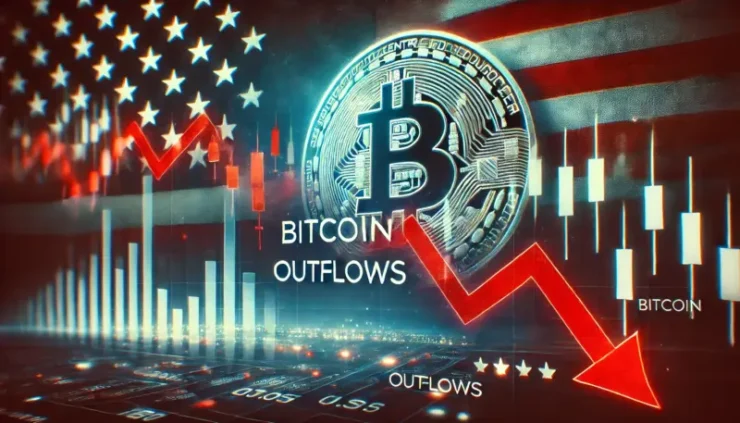A staggering $1.14 billion has flowed out of U.S. Bitcoin ETFs over the past two weeks, marking one of the most significant capital shifts since the investment vehicles were introduced.
The sharp sell-off highlights growing investor unease as economic uncertainty, trade tensions, and shifting monetary policies take center stage. The outflow, spanning February 7 to February 21, follows a string of withdrawals from major funds, including Grayscale’s GBTC, Fidelity’s FBTC, and BlackRock’s IBIT.
The market downturn comes at a time when Bitcoin prices hover around $61,000, reflecting broader hesitancy among institutional and retail investors. According to SoSoValue, the outflow surpasses June 2024’s previous high of $1.12 billion, further reinforcing concerns about market stability and sentiment.
Analysts suggest that macroeconomic pressures—particularly those tied to interest rate expectations and global trade policies—are playing a pivotal role in investor decision-making.
Interest Rates and Inflation Driving Market Hesitation
The Federal Reserve’s stance on interest rates has been a significant factor behind the Bitcoin ETF sell-off. Inflation remains stubbornly above target, forcing investors to reconsider their exposure to risk assets, including cryptocurrency. Marcin Kazmierczak, a senior market strategist, explains: “With expectations of rate hikes persisting, investors are increasingly looking for stability in traditional assets over digital currencies.”
Over the past month, Bitcoin ETFs have seen a mix of inflows and outflows, but the trend remains predominantly negative. SoSoValue data shows a four-day streak of net outflows leading up to February 21, with $62.77 million leaving the market that day alone. This sustained pressure reflects broader macroeconomic concerns that extend beyond cryptocurrency markets into equities and bonds.
Trade Tensions Weigh on Bitcoin Sentiment
Escalating trade tensions between the U.S. and China have added another layer of uncertainty. The recent announcement of new tariffs has sparked investor fears of a prolonged economic slowdown, triggering flight from riskier assets. Bitcoin ETFs, often seen as an indicator of institutional sentiment toward digital assets, have become a key casualty in the broader market pullback.
Kazmierczak notes that while some large investors, including Abu Dhabi’s Sovereign Wealth Fund and Wisconsin’s Pension Fund, continue to hold significant Bitcoin ETF positions, others have opted to reduce their exposure. The uncertainty surrounding upcoming trade talks between President Donald Trump and President Xi Jinping could further shape the trajectory of Bitcoin investments in the coming weeks.
Institutional Confidence Versus Short-Term Volatility
Despite the recent downturn, long-term holders remain confident in Bitcoin’s growth potential. Institutional investors, particularly sovereign funds and pension funds, have maintained substantial stakes in BlackRock’s IBIT and Fidelity’s FBTC, signaling a belief in Bitcoin’s future appreciation.
However, the divergence between institutional confidence and retail outflows underscores the market’s complexity. Short-term volatility, influenced by economic indicators and global events, continues to drive significant ETF redemptions, even as some investors double down on their positions.
With Federal Reserve policy decisions and ongoing trade negotiations set to dominate headlines, the cryptocurrency market faces continued uncertainty. The coming weeks will be critical in determining whether the Bitcoin ETF outflows stabilize or persist, further shaping sentiment in an already turbulent investment environment.





